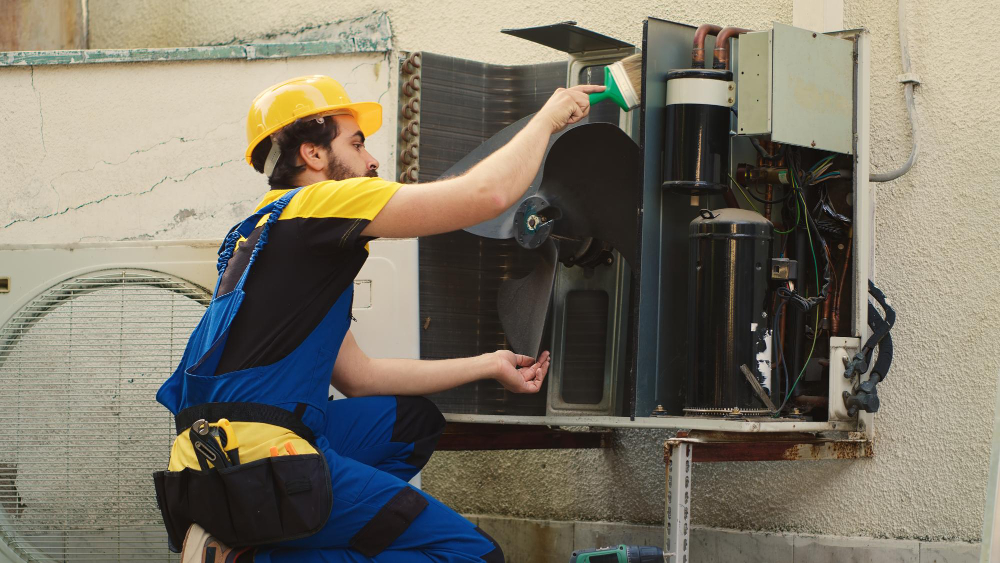Most of the time, your air conditioner hums quietly in the background, doing what it’s supposed to do—until one day, it doesn’t. It starts making noises, cooling unevenly, or needing repairs more often. So, when does it move from a repair issue to something more serious?
Here are five signs it may be time to stop depending on air conditioning repair services and start thinking about a replacement.
Five Signs
1. Your Air Conditioner Is 10 to 15 Years Old
Why age matters:
- Most AC units last around 10–15 years.
- As parts wear out, performance slowly declines.
- Older systems are often less efficient, even if they seem to be running fine.
Even if it’s still turning on, an aging unit might be costing you more in the background—through energy use, lower performance, or frequent tune-ups.
2. You’ve Been Calling for Repairs Too Often
Spot the pattern:
- A few small fixes over the years? Normal.
- Several repairs in one season? Not so normal.
- Replacing the same part more than once? That’s a red flag.
If you’ve already paid for air conditioner diagnosis a couple of times and still keep calling for air conditioning repair services, the costs can pile up quickly.
When to start thinking about replacement:
| Number of Repairs | Typical Cost | Recommendation |
| 1–2 Minor Fixes | Low ($100–300) | Monitor the system |
| 3–4 Moderate Fixes | Medium ($400–900) | Evaluate replacement |
| 5+ Major Fixes | High ($1000+) | Likely time to replace |
Sometimes, the money going into repairs could be better spent on a newer, more reliable unit.
3. Your Energy Bills Are Rising
What you might notice:
- Your bill has gone up, but your usage hasn’t.
- The system runs longer to reach the same temperature.
- You find yourself adjusting the thermostat more often.
Over time, air conditioners lose efficiency. This leads to higher operating costs, even when everything seems “fine” on the surface.
If energy usage is creeping up, the system might be working harder than it should—especially during Martinsburg or Charles Town’s hotter months.
4. Your Home Doesn’t Cool Evenly
Hot spots in the hallway. Cool air in one room but not the next. These are signs the airflow isn’t being properly distributed.
Possible causes:
- Weak airflow from aging components
- Leaks in ductwork
- A failing blower motor
Once these issues become frequent—even after filter changes and minor repairs—it’s time to ask whether the system can still keep up.
Inconsistent cooling is more than a comfort issue. It could also mean the unit is no longer suited for your home’s size or layout.
5. Strange Noises or Smells Have Started
Common sounds and what they might mean:
- Banging – Loose or damaged components
- Hissing – Possible refrigerant leaks
- Grinding – Motor or fan bearing issues
Common smells:
- Musty – Mold buildup inside the system
- Burning – Electrical wiring or overheating problems
A quick air conditioner diagnosis might reveal the root cause. But if these signs keep coming back, they might signal deeper mechanical failure.
Bonus Tip: You’re Pairing It with an Old Heater
If you’re already using a Residential Heating Service to maintain an older furnace or boiler, and your AC is also aging, it may make sense to evaluate both systems together. Coordinating updates to both can improve year-round comfort and system compatibility.
What to Do When You’re Unsure
You don’t always need a dramatic failure to make the change. Sometimes, it’s the slow build-up of little problems:
- Your AC turns on, but the house never gets cold enough.
- You’re using fans to support cooling in certain rooms.
- You’ve already spent time and money on air conditioning repair services multiple times this year.
When these small frustrations start to add up, it might be time to stop patching and start planning.
Final Thoughts
Air conditioners don’t last forever. Most give subtle hints long before they completely shut down. Whether it’s rising bills, uneven cooling, or too many calls for help, the signs are often right in front of us.
Taking time to observe these changes—and act before the unit fully breaks down—can save stress during a heatwave.
If you’re already exploring options, the next step might simply be a conversation. You can always start with a fresh air conditioner diagnosis to see where things stand. And if you’re ever unsure, just Contact Us to get an honest second opinion.



